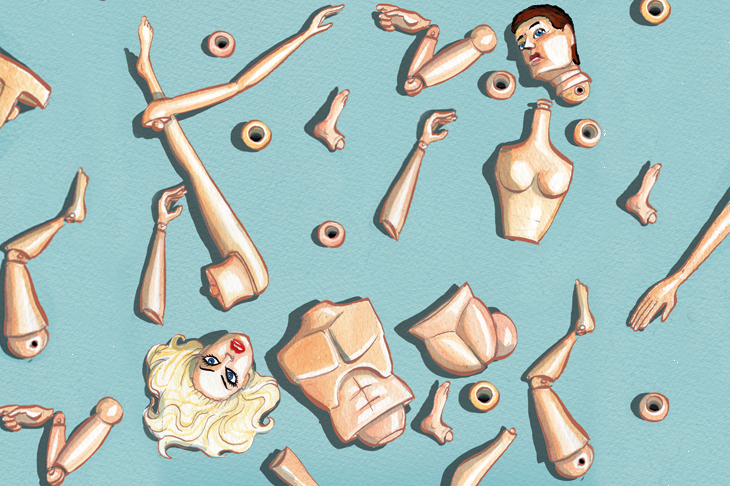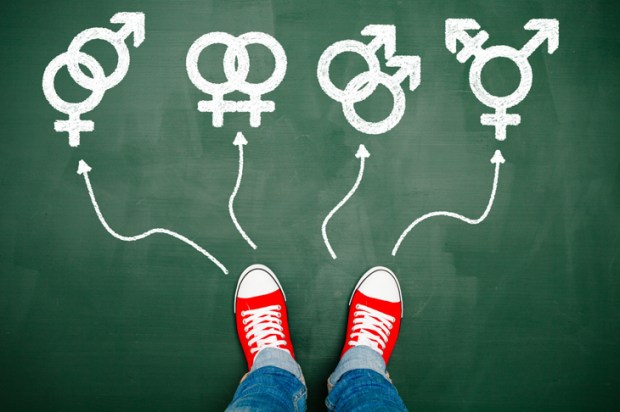Your 13-year-old daughter tells a teacher that’s she’s uncomfortable with her body. She prefers trousers to skirts, football to ballet. She says she thinks she’s a he and wants to be treated as a boy at school. Would the teacher tell you your daughter wants to change gender?
Your 11-year-old granddaughter comes home from school upset. Changing after gym, another girl stood watching her undress and playing with her penis. (The girl in question is transgender, so yes, she has a penis.) When your family complains to the school, what happens?
In the first case, no, the teacher wouldn’t tell you. ‘All people, including children and young people, have a right to privacy… Staff should not disclose information that may reveal a pupil’s trans status to others, including parents.’ In the second, it’s not the girl with a penis who has a problem, it’s the girl without one. She and her parents have wrongly assumed the child with the penis is ‘not a real girl’. That error should be ‘challenged through training and awareness raising’ so your granddaughter is comfortable with her classmate.
These cases are real. So are the responses, which come from the Allsorts Trans Inclusion Schools Toolkit, guidelines for school staff developed with Brighton and Hove City Council and used, in different forms, by several dozen councils in England and Wales. It is unsurprising that schools want guidance on how to deal with children describing themselves as transgender, since more and more seem to be doing so.
Why? Is it about tolerance: as society becomes more understanding, more trans people feel able to ‘come out’? Could the internet be accelerating ‘social contagion’, where the idea of being transgender spreads rapidly?
What explains the disproportionate number of girls (child ‘assigned female at birth’, to use the approved term) who are starting a journey that can lead to hormone treatment, then binding and ultimately removing their breasts? Is it possible that this is simply part of a wider crisis of mental health among girls?
I don’t know, and neither do the doctors and scientists who study this issue. If you talk to the clinicians at the Tavistock Clinic in London, the NHS centre for the treatment of gender-variant children, they’ll tell you that all the factors I mentioned may be at work, but the evidence base is still incomplete, that they need more time and data before offering explanations. (They’ll also tell you that quite a lot of the children referred to them as ‘transgender’ will in time ‘desist’ and decide to live in their original gender.)
The government now intends to commission research into all this. You might think that sounds sensible and mundane. You would be wrong.
According to Tara Hewitt, founder of the Trans Equality Legal Initiative (TELI), prominent campaigner for transgender rights and an adviser to numerous public bodies including the NHS, the proposed research is ‘absurd and offensive’. The project should be ‘dropped in the bin — it’s simply not an inquiry that needs to happen,’ Hewitt reckons.
This is the quintessential trans-rights response to scrutiny: even looking for facts about children’s welfare is transphobic. Just accept that trans girls are girls and trans women are women. End of debate.
If you haven’t heard that mantra ‘trans women are women’, you will soon, for it is the orthodoxy of the moment, a phrase even politicians are expected to repeat as proof of their embrace of trans-equality. And woe betide anyone who suggests that donning a dress and a new name doesn’t magically render a male body female. Biology is transphobic too.
Women’s Minister Penny Mordaunt said the magic words in the summer when she announced an overhaul of the Gender Recognition Act, the law that allows someone to change their legal gender. Right now, a man can legally be recognised as a woman if he ‘lives in gender’ for two years and has that transition certified by a doctor.
Under reforms advocated by many (but not all) transgender campaigners, such ‘gatekeeping’ would be scrapped and replaced by a system of ‘self-identification’, that means that if a man says ‘I am a woman’, he is in fact a woman and must be treated as such, with all the legal and cultural rights that go with womanhood. Even before any change in the law, public bodies and companies are effectively adopting such a policy, often after receiving highly dubious quasi-legal advice from lobby-ing groups.
Many people still have an idea that changing gender involves some sort of physical change. In fact, sexual reassignment surgery is rare. Many and probably most transgender people keep the bodies they were born with; there are no official figures (the absence of good data defines this issue) but some estimates suggest up to 80 per cent of ‘trans women’ retain their male anatomy and genitals.
Exactly who counts as a trans woman is another issue where most of the public might find some surprises. According to Stonewall’s ‘trans umbrella’, you are transgender if you sometimes cross-dress.
That’s what makes Philip Bunce a woman, when he feels like it. Mr Bunce is a senior Credit Suisse executive who sometimes wears a dress and calls himself Pippa. On that basis, the FT recently named him one of its Top 100 Champions of Women in Business.
Such cases help explain why a significant number of women (and men) are deeply uncomfortable with the agenda promoted by Stonewall, TELI, Allsorts Youth Project and the rest of a loose network of ‘trans-rights’ advocates who enjoy immense influence in public life today, and significant public funding.
Others groups include Mermaids and the Gender Identity Research & Education Society, both frequently consulted by councils, NHS trusts, police forces and Whitehall departments for guidance on applying the law around transgender children. Both are tiny charities run not by lawyers but by parents whose children changed gender; it’s hard to think of another field of policy where personal experience is prioritised over objective expertise.
According to Michael Biggs, an Oxford University sociologist, the speed at which transgender rights advocates have advanced their cause is unprecedented in western history. In less than a decade, he suggests, the movement has embedded itself in public and corporate life and often succeeded in changing policy and practice without significant scrutiny or question.
How? Stonewall is the biggest exponent of the argument that trans rights are the new gay rights, and that conflation of gay and trans is key to the trans lobbyists’ power, especially in the public and voluntary sectors, where allegations of intolerance can end careers. The CEO of a major charity, a woman who has worked at board level in FTSE 100 companies, recently told me she was simply ‘too scared to speak publicly’ about her fear that the systematic misapplication of equality laws is eroding women’s rights and safeguarding rules. Being called a bigot might cost her her job, she says.
In fact, a good many gay people are uncomfortable with the addition of T (Transexual) to LGB (Lesbian, Gay, and Bisexual). Some of the most vocal critics of transgenderism are lesbians, their concerns based in part on the fact that one logical outcome of ‘trans women are women’ is that lesbians should regard male-bodied trans women as female and thus as potential sexual partners. Yes, this most progressive of social movements tells women who really don’t like penises that they must consider having sex with people who have penises.
Among the gay men voicing doubts about all this is Simon Fanshawe, one of the founders of Stonewall, who now laments that there is ‘no room for dissent’ from the official trans orthodoxy — even though many trans people themselves are uncomfortable about the militancy practised in their name. They fear that the policies promoted by the ‘trans women are women’ camp risk a backlash against trans people as the wider population notices the increasingly awkward consequences of the doctrine. That day is fast approaching,
In the past month, the casual consumer of news media might have seen any or all of the following stories in the headlines: a transgender rapist was sent to a women’s prison where she used ‘her penis’ to sexually assault women; Girl Guide leaders were expelled for questioning a policy of allowing transgender girls (with penises) to share tents and showers with girls born female; a Durham university student sacked as editor of a philosophy journal for tweeting an article (by me) which asked if it is a crime to say women don’t have penises; the removal on grounds of transphobia of a billboard which repeated the dictionary definition of ‘woman’ as ‘adult human female’.
All raise serious issues of public policy, yet politicians are silent, fearful of questioning the trans-rights advocates and the consequences of their orthodoxy. Sometimes with good reason, too. Those MPs, mostly women, who have tried to debate this issue have been showered with online hatred. I’ve stopped counting the politicians, cabinet ministers among them, who tell me privately they worry about the trans agenda but won’t say so publicly
That silence troubles me. I am no social conservative, no culture warrior defending ‘traditional’ values. My interest here is fear of political failure, of what happens when sensible politicians fail to do their job by weighing evidence and reconciling conflicting interests. The failure leaves the trans debate dominated by shrill and aggressive groups intent on eliminating inconvenient evidence and dissenting views.
Failing to debate trans issues on the facts also creates the conditions for deliberate and harmful populism. Rows about trans people in bathrooms are a staple of America’s culture wars. The current vacuum of leadership on the issue means Britain could easily go the same way, if a politician on the make decided to make trouble. That would benefit no one, least of all transgender people, who deserve to live their lives with the same ordinary dignity as anyone else.
That’s not all that’s at stake. Trans-genderism is the perfect ideology for the on-demand internet age. It gives unquestioned primacy to ‘lived experience’, elevates emotion above evidence and convicts — after instant trial by social media — any scrutiny or doubt of that most heinous contemporary crime, intolerance. It chills debate and stifles critical thinking.
Should policies and laws be made on the basis of facts and evidence, or feelings and demands? You might not think so today, but the way our political system responds to the transgender rights movement will matter to everyone.
Got something to add? Join the discussion and comment below.
Get 10 issues for just $10
Subscribe to The Spectator Australia today for the next 10 magazine issues, plus full online access, for just $10.
You might disagree with half of it, but you’ll enjoy reading all of it. Try your first month for free, then just $2 a week for the remainder of your first year.














Comments
Don't miss out
Join the conversation with other Spectator Australia readers. Subscribe to leave a comment.
SUBSCRIBEAlready a subscriber? Log in